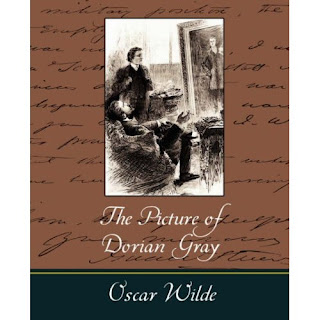
If you love flowers, this book is for you. I mean, if you seriously love flowers. I swear, at least once a page Wilde mentions flowers. Either some flowers in a vase, or flowers in a garden, or something or someone looks like a flower or is colored like a flower, etc. What's up with that? Do flowers represent the beauty of youth, both of which fade and wither after blossoming with great beauty? That's my guess. But maybe Wilde just likes flowers. A lot.
My only other exposure to Oscar Wilde, aside from rreading this novel, was listening to The Smiths back in the 1980s. Morrissey was seriously into Oscar Wilde...and flowers too, how interesting. I still have a faded old Smiths t-shirt with a bouquet of roses pictured on the front. "A dreaded sunny day, so I meet you at the cemetery gates, Keats and Yeats are on your side, but Wilde is on mine".
Anyway, I think we all know the basic story of this book. Dorian Gray is a beautiful young man, who has his portrait painted by an artist and admirer, Basil Hallward. A friend of Basil's, Lord Henry Wotton, meets Dorian at one of the sittings, and imparts on Dorian that his beauty will fade. Dorian is distressed, and wishes the painting, which he fears will serve as a reminder of his beauty after it is long gone, would age instead of himself. Naturally he gets his wish, and naturally it all turns out very badly in the end.
Lord Henry exerts a corrupting influence on Dorian, both through his words and a rather mysterious book he gives Dorian. Dorian embarks on a hedonistic life, using his beauty to seduce women and men alike. Woohoo! And as his corruption and decadence grows, the portrait, which is now safely locked away in Dorian's attic, becomes more and more hideous. Dorian takes opium on occasion, eventually kills Basil Hallward in front of his portrait, and blackmails a former male lover into helping him dispose of the body, causing the former lover to commit suicide afterwards. How delightfully wicked indeed! Eventually, after nearly being killed by the vengeful brother of a woman he once loved and dumped (which lead to her suicide), he decides to give up his decadent life and repent for his crimes. But when he looks at his picture after deciding this, his portrait has eyes that betray hypocrisy. Dammit, how does that painting always KNOW? So he decides to destroy the portrait with a knife...and when he stabs at the picture, his household servants hear a scream, and find him lying dead, hideously aged as in his portrait and stabbed with his own knife, while his portrait now looks like his young beautiful self. Well, OK, kill your conscience and you kill yourself, that much I get. But clearly Dorian didn't think this whole thing through very well...I mean, dude, if a picture is aging and you're not, then destroying the picture is probably not going to work out so well.
This was a fun read, and a quick one (it only took me a week), but I didn't get into it in an intellectual way as I did with "Of Human Bondage" and "Main Street". There's a lot in this book to think about...the corrupting influence of others, the role of art in life, the power of youth and beauty, and the superficial nature of society that exalts both. Lord Henry in particular, but also the other characters at times, speak in aphorisms which must be read slowly and mulled over. Still, this book didn't get my mind going so much, and I'm not sure why. Maybe these issues just don't hit as close to home for me as the ones touched on in the previous two books. Or maybe it's the setting in aristocratic Victorian England that seemed a bit alien to me...fun for a wicked gothic tale, but not something that seems so relevant to my own life. And funny, that's similar to what I touched upon on the last post...how it's hard to get high school students today interested in 19th century English literature, as they can't relate to it so well. Hmm, maybe the same thing is at work a bit in me. Or not. Maybe it was just this book. Well, we'll see, as I have many 19th century english novels ahead of me on The List. And don't get me wrong, I enjoyed the book a lot.
But now it's on to the next book! I should probably have read "Faust" next, to stick with the general theme of this book, but instead I've turned to the story of a life the very opposite of Dorian's decadent one..."The Autobiography of Benjamin Franklin".





